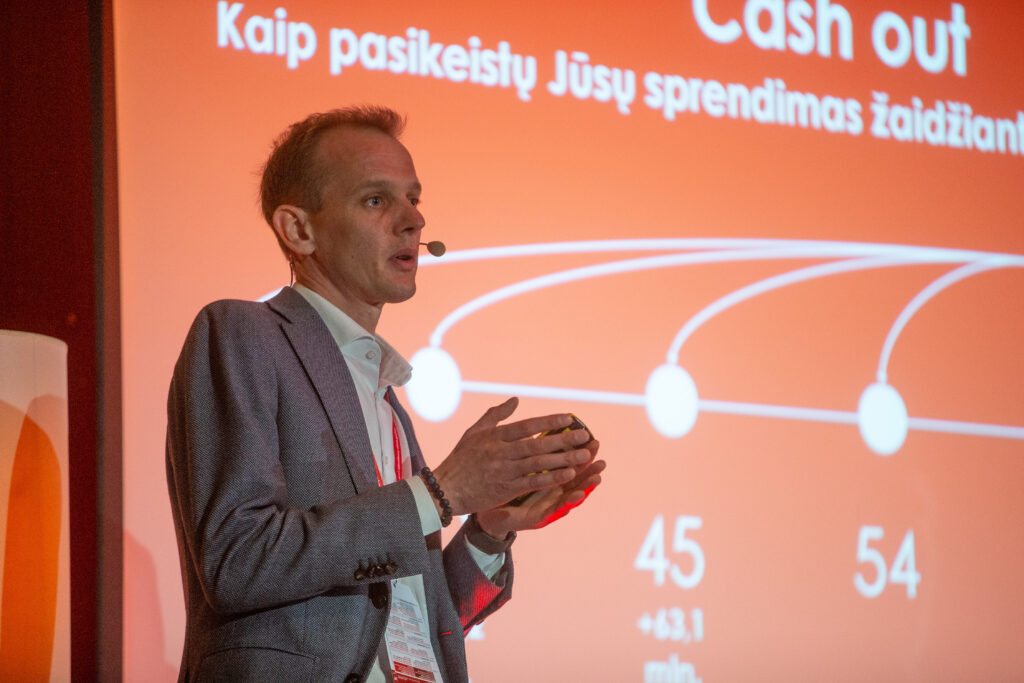TOP 1000: Lithuanian leaders demonstrated outstanding resilience

In Lithuania, Creditinfo actively cooperates with business media, providing diverse analytical information in the form of various sectoral reviews and highlighting trends in the key business performance indicators. Every year the main business media channel, the Verslo žinios (Business News), publishes a list of TOP 1,000 largest Lithuanian companies reflecting on the changes that took place over the last year.
In July, the Verslo žinios published its latest update of TOP 1,000 list of business companies compiled based on Creditinfo’s data and corporate financial statements filed in 2020. Luckily, a positive trend can be seen: as many as 59 percent of companies saw their income grow over the last year, which was stimulated also by decision of the global leaders aiming at economic recovery.
At the courtesy of the Verslo žinios editorial staff we are publishing a part of the exhaustive publication; the link to the original article is provided at the end of the text.
—————————————————————————————————————————————————
Published on 16 July 2021.
- The Verslo žinios presents the latest update of TOP 1,000 list of Lithuanian companies.
- Major businesses have successfully adjusted to the new reality.
- Business leaders generated 24.7% more pre-tax income in 2020 than before the pandemic.
- According to Creditinfo’s data, one third of TOP 1,000 companies reduced the likelihood of delayed payments.
- Biotechnological company UAB “Thermo Fisher Scientific Baltics” skyrocketed to the third position on the list.
Contrary to the gloomy pandemic predictions, the pre-tax income of the 1,000 largest Lithuanian companies in 2020 grew by a quarter. Although some of the major corporations were hit really hard by COVID-19, a substantial proportion of them rose up to the challenge transforming themselves and reporting unexpected returns.
These trends are reflected in the TOP 1,000 list of the largest Lithuanian companies drawn jointly by the Verslo žinios and Creditinfo based on income data for 2020. The list includes companies which filed their financial statements in time, i.e., by 31 May, with the Centre of Registers (CR).
Income plummeted against growing profit
Traditionally, the TOP 1,000 list is dominated by companies from three economic sectors, such as: wholesale and retail (381 company), manufacturing (263 companies), transportation and storage (136 companies). All these taken together account for more than three fourths of all the companies on the list.
Almost 500 of businesses are located in Vilnius county, another third operates in Kaunas and Klaipėda counties (223 and 107 companies, respectively). The list includes 76 companies with fewer than 10 employees.
Last year 1,000 of the largest Lithuanian companies generated EUR 51.3 bln. income, i.e., 1.3% less than in 2019. However, in aggregate, these companies earned EUR 3.3 bln. of pre-tax profit, which is an increase of 24.7% from 2019.
Profit of major companies grew the fastest
The growth of TOP 1,000 companies was far more robust than that of the reminder businesses. According to preliminary estimates of the Department of Statistics, in 2020 in Lithuania non-financial companies generated EUR 96.3 bln. income and EUR 6.7 bln. pre-tax profit: in comparison to 2019, the income shrank by 0.4%, while pre-tax profit grew by 3.9%.
Last year 10 companies passed a symbolic threshold of 0.5 bln. of sales income, five of which are retail or wholesale companies. Thermo Fisher Scientific Baltics, UAB skyrocketed to the third place on the list, reporting EUR 1.26 bln. in turnover.
“Despite the prevailing trend of moderately shrinking income amongst the largest 1,000 Lithuanian companies compared against 2019, and a decreasing number of staff, companies generated almost 25% higher profit before tax. An obvious leader in this category is the biotechnological company Thermo Fisher Scientific Baltics, UAB – a manufacturer of COVID-19 reagents and vaccine components. Its pre-tax profit reached EUR 472.6 mln., thus securing the company the first place among the leading companies in terms of this indicator”, said Jekaterina Rojaka, head of business development and strategy at Creditinfo.
According to Indrė Genytė-Pikčienė, chief economist at INVL Asset Management, UAB, a more rapid profit growth among the top 1,000 companies demonstrates the success of major companies in making the best out of the pandemic situation.
Usually, due to the advantage of scale, large companies have more leverage and freedom of manoeuvre than the smaller ones in the face of unexpected circumstances, when they have to negotiate with creditors, suppliers, and other partners”, she explained.
The original publication may be accessed here: https://vz.lt/finansai-apskaita/2021/07/16/top-1000-lietuvos-verslo-lyderiai-parode-neitiketina-atsparuma
Authors:
Eglė Markevičienė
Jovita Budreikienė
Creditinfo Lithuania study: Men earn more than Women

In Lithuania men earn more than women in 72 economic sectors, while women do so in 9 sectors. Human resource specialists recommend inquiring more boldly about corporate career and pay policies.
The study conducted by Creditinfo Lithuania suggests that out of 81 sectors into which economic activities of Lithuania-based companies are broken down, in 72 of them men earn more than women on average. Pay for men usually exceeds pay for women by roughly 30-50 percent, while the largest positive gender gap of 19.2 percent in favor of women has been recorded in education. In the reminder eight sectors women usually earn 8.5 percent more compared to men on average. The most striking gender pay gap favoring men is reported in 30 economic sectors where the highest monthly pay may range from EUR 1,464 to 2,671. Human resource specialists recommend staff inquiring about corporate pay and career policies.
As of May, when Sodra started publishing gender pay gap data, the credit bureau Creditinfo Lithuania has analyzed pay received in various economic sectors. The study suggests that in an absolute majority of activities, especially those with the highest pay, men usually earn more than women on average: in telecommunications (50.1 percent), in medicinal products and pharmaceutical services (47.8 percent), in veterinary activities (45.1 percent), in insurance and reinsurance (41.9 percent), in financial services (43.3 percent), in cinema and TV programme production (40,4 percent), in manufacturing of power generation equipment (38 percent), operation of headquarters and consultation activities (35.6 percent), in information services (37 percent), in production of computer, electronic and optical devices (34.8 percent), in research and experimental activities (34.8 percent), in programme production and broadcasting (34 percent).
Sectors which particularly stand out are air transport, gambling, and gaming industry, where men earn 95.1 to 127.6 percent more than women on average.
There are several sectors where women are usually higher earners, such as: education (19.2 percent), land transport and transportation by pipelines (10.7 percent), social work (11.6 percent), in-house social care activities (8.3 percent), furniture production (7.2 percent), postal and courier services (6.2 percent), manufacturing of tobacco products (5.8 percent), and manufacturing of metal products (5.1 percent).
Publication of gender pay gap will boost corporate sustainability
According to Jekaterina Rojaka, the head of corporate strategy and development at credit bureau Creditinfo Lithuania, while analyzing the corporate operations other factors, in additional to the financial indicators, such as earnings and profit, are becoming increasingly more relevant – these factors determining the overall corporate reputation include operational transparency, corporate values and internal culture, staff and social responsibility policies.
“Sustainability is starting to play a more important role on the corporate creditworthiness and reliability, as it entails transparency in corporate policy on staff relationship, corporate policy on partners and communities, and contribution to solutions of issues important for the society”, J. Rojaka says. Statistics on average pay by men and women supplements information about the prevailing motivational instruments used by the company and career opportunities.”
According to J. Rojaka, gender pay gap is a particularly sensitive issue also because on the Lithuanian labour market men and women enjoy an equal employment rate. The Eurostat data suggests that in the age group of 20-64 in Lithuania the gender employment rate gap (with 79 percent of men and 77.4 percent of women having employment) is the lowest in the whole of the European Union, accounting for a mere 1.6 percent in Lithuania.
According to the data of the Department of Statistics of Lithuania, in 2020 in Lithuania there were 1.358 mln. people having employment – 679.9 thousand and 678.2 thousand of men and women, respectively. The employment rates of men and women in different economic sectors varies. For instance, there are many more men than women engaged in agriculture (2.06 times more or 52.2 thousand versus 25.1 thousand, respectively), in power and gas supply (4.3 times more, or 7.7 thousand and 1.8 thousand, respectively), in water supply and wastewater treatment (2.5 times more, or 13.1 thousand and 5.2 thousand, respectively), in construction (10.7 times more, or 91.2 thousand and 8.5 thousand, respectively), in real estate operations (1.6 times more, or 7.7 thousand and 4.8 thousand, respectively).
There are sectors, though, where women’s employment rate is several times higher than that of men’s, these sectors are: health care and social work (6.1 times higher, or 13.6 thousand and 83.1 thousand, respectively), education (3.9 times higher, or 27.7 thousand and 106.9 thousand, respectively), accommodation and catering (2.4 times higher, or 9.9 thousand of men compared to 23.7 thousand of women).
Among the sectors with a similar level of employment rate among both genders the average salaries paid to men remain higher than salaries of women. These sectors include wholesale and retail (104.1 thousand of men and 114.8 thousand of women), information and communication (23.6 thousand and 15.6 thousand), financial and insurance activities (9.9 thousand and 16 thousand), administration (30.8 thousand and 26.2 thousand), public administration and defense (43.2 thousand and 43.2 thousand), creative and leisure activities (10.1 thousand and 16.6 thousand).
Meanwhile, the representative of Creditinfo notes that while analyzing average salaries paid in any individual company account shall be taken of the gender balance, the positions held by men and women, as well as the competences and experience needed in the given position. Moreover, she notes that, for instance, in air transport pilots are usually men, while women mainly work as flight attendants, which explains a huge gender pay gap in the air transport sector.
Human resource specialists recommend analyzing data carefully and discuss about career and pay more boldly
Šarūnas Dyburis, the Managing Partner at AIMS International Lithuania, notes on a shrinking gender pay gap among staff with the same level of competences and experience.
“Overall, within the European Union Lithuania is somewhere in the middle in terms of gender pay gap – an average pay for men is 13.3 percent higher than that for women, compared against an EU average of 14.1 percent”, Š. Dyburis said. Our country stands out in that the gender pay gap has dropped to the minimum among men and women with the same level of experience and competences. However, due to objective reasons, such as career breaks due to maternity leave, women reach the highest pay levels slightly later than men, which also affects the average salaries”.
The head of AIMS International Lithuania notes on an increasing popularity of corporate motivational and pay policies in Lithuania offering clearer career possibilities, encouraging the pursuit of higher performance indicators, and strengthening of cooperation spirit within organizations.
“We would like to encourage women plan their career path more boldly, be more proactive in seeking new career opportunities, and negotiating for higher pay more ambitiously. All candidates without exception should openly inquire about corporate career policies and learn about staff achievement appraisal and motivational systems”, recommended Š. Dyburis.
For more information see:
- https://ec.europa.eu/eurostat/statistics-explained/index.php?title=Gender_statistics#Labour_market
- https://osp.stat.gov.lt/lt/statistiniu-rodikliu-analize?hash=f3f0ba78-6fb2-433f-ad92-ef032be74a9e
For more information contact:
Jekaterina Rojaka, Head of business development and strategy at Creditinfo Lithuania (jekaterina.rojaka@creditinfo.lt; +370 612 73515)
Šarūnas Dyburis, the Managing Partner at AIMS International Lithuania (sarunas.dyburis@aims.lt; +370 616 72727)
How to build an impeccable credit history

Within the first days of our lives, we are all issued a birth certificate which becomes the first document of the pile that we are to collect during our lifetime. Birth certificates are followed by passports, then graduation certificates, college or university diplomas. Reaching the age of majority entails, among other things, responsibility not only for one‘s professional career, but also for financial decisions which are reflected in the credit history. In other words, credit history is a yearbook of one‘s financial obligations, which is read by banks, leasing companies or other institutions in order to assign you to the categories of either reliable or less reliable clients and decide whether they are willing to accept you for credit.
No Credit Without Credit History
According to the surveys, more than half of the adult population of Lithuania are active users of credits to finance purchase of the real estate, vehicles, household appliances, furniture, PCs, phones, etc.
To get a credit, you apply to the banks or leasing companies. They first look into your credit history which shows how well you performed our financial obligations in the past, including consistency of timely payments for electricity, telecommunication services or garbage removal, also timely repayment of other credits and any overdue debts.
A good or bad credit history determines whether you will be accepted for credit to buy a new refrigerator instead of an old broken one, whether sellers will agree to sell you a new phone just after signing an agreement on payment in installments over the next two years. If the credit history is sound, you can expect the most favorable conditions and trust of the seller. A poor credit record means that you may have to pay the entire amount at once.
A History of Amounts and Discipline
The credit history reflects two types of information. The first one is an account of financial obligations, credits in the banks, consumer loans from credit institutions or peer-to-peer lending platforms, leasing, etc. Lenders use this information to assess the client‘s budget sufficiency, i.e., the percentage of income spent for servicing the existing debts. The second type of information is the track record of repayment of debts indicating the discipline of making payments for credits, mobile phone, internet, cable TV and other bills.
Banks Favor Positive Rather than Empty Credit History
The staff of the credit bureau is often asked what a good credit history is. One may think that lenders favor those who never had a loan, leasing or credit card, and never delayed payments to service providers, hence their credit history is empty. Yet the lenders‘ approach is different. On the one hand, an empty credit record may indicate that you had no need to borrow or to buy on lease in the past. On the other hand, who is more trustworthy: a client who repaid his lease or loan in time, or a person who never had any financial obligations? A survey conducted by “Mano Creditinfo“ revealed that banks tend to be more favorable towards clients who had financial obligations in the past as they are more predictable.
Financial institutions tend to trust clients with good credit history and offer them better conditions, such as a lower down payment, lower interest rate and more flexible repayment terms. For instance, Swedbank‘s Institute of Finances earlier advertised that good credit history may save up to several thousand euros in interest on home loans. Good credit history will save you up to EUR 500 on a loan for a EUR 5,000 worth car, or up to EUR 1,700 on a EUR 10,000 worth car lease.
Can You Fix a Bad Credit History?
Yes, you can, but it will take time and effort. There are several factors that determine a bad credit history, including high financial obligations, excessive and unreasonable borrowing, borrowing to service outstanding debts, delayed payments and other. If your credit history contains any such events, you have to brace yourself for a hard time, as cosmetic adjustments will not erase or eliminate them. If you tend to assume too many financial obligations, you will have to reduce their number and curb your appetite for borrowing for some time at least. If you have any overdue payments, you are recommended to make the payments as soon as possible and never delay them again.
Financial institutions usually analyze the credit history of the recent 2 or 3 years, and the negative impact of the sins of the past gradually fades away over time. Thus, if you have a poor credit history and decide to change your approach towards your financial obligations today, financial institutions may still have questions about your past financial behaviour for a couple more years to come.
Mistakes to be Avoided
Information about the financial relations and obligations will accompany you throughout your entire life telling a story of either a high financial discipline or lack of it. If you decide to borrow, you must carefully assess your ability to cover the debt and think about the ways to ensure the repayment even if you lose your income. Negative records appear in your credit history very quickly, within a month from the day the payment was due. Erasing this record from your credit history will take years, though.
Aurimas Kačinskas,
CEO – Creditinfo Lietuva.
Creditinfo invites the strongest companies to join the effort of making Lithuania greener

Green Parks of the Strongest Companies to Flourish in Lithuania
This year the Strongest will have an opportunity to contribute directly to the building of a greener Lithuania and to enter their names in the parks of the Strongest in Lithuania. Creditinfo shall plant a tree for each certificate awarded to the financially strongest companies. A new park of oak, maple, birch and linden trees will be planted in one of the busiest roundabouts between the Gerosios Vilties, Laisvės and Savanoriai streets in Vilnius this autumn.
The initiative of the credit bureau has received support from the Vilnius City Municipality. According to the Municipality, there are still many public areas in Vilnius which need to be planted, meanwhile the increasing population of the city drives the necessity to create as many green areas as possible.
“We welcome the initiative of Creditinfo to contribute to the making our city more beautiful and we support their idea of planting trees at one of the busiest roundabouts that is crossed by tens of thousands of citizens and visitors of Vilnius every day,“ says Remigijus Šimašius, the Mayor of Vilnius. “We are glad to see that the strongest companies in Lithuania make active contribution to the improvement of the environment around us.“
Creditinfo awards the Strongest in Lithuania certificates to the companies that are selected for their outstanding financial indicators, including appropriate payment of taxes, timely discharge of obligation towards employees and business partners, and sound financial discipline. Every year Creditinfo assesses businesses against over a hundred of different indicators and nominates up to 2.5 thousand of the strongest companies in Lithuania. Over 11 years of certification, the title of the Strongest in Lithuania has been awarded to over 20 thousand companies.
“This year the Strongest in Lithuania certification follows the principle Strong Companies Make Strong Decisions. Society expects contemporary companies to demonstrate comprehensive leadership in all walks of life. It is extremely important not only to secure financial stability of a company, but also to put into practice social responsibility and take care of the public good,“ says Aurimas Kačinskas, CEO of Creditinfo Lietuva. “We invite companies to join the effort of building a stronger and greener Lithuania.“
According to the CEO of the credit bureau, the capital city of Vilnius has been chosen to be the first to see the planting of the Strongest in Lithuania park. The traffic in Vilnius is heavy, making the quality of the air a high priority, therefore the first Strongest in Lithuania park is to be planted in the busy Gerosios Vilties roundabout. In the future, Vilnius may be followed by other cities and towns, depending on the involvement of the strongest companies in the initiative.
The Value of the Certificate is Higher this Year
The CEO of the credit bureau points out that this year the companies awarded with the Strongest in Lithuania certificate have a strong reason to be proud of sustainability of their activity. “Not all businesses have managed to secure their financial stability during the pandemic, therefore this year the award of the certificate recognizes the ability of businesses to weather a crisis and flexibility to adjust to the exceptionally complex conditions,“ says A. Kačinskas. “To distinguish companies with sound financial discipline, we will have their names written on the special memorial stand to be put up in the park.“
About the Strongest in Lithuania certificate
The credit bureau launched the Strongest in Lithuania certification in 2010, and this year counts the 11th season of certification already. The Strongest in Lithuania is the only recognized business credibility certificate in the Baltics with the longest history of existence. Over the decade, more than 15,000 Lithuanian companies have earned the right to use the certificate as a proof of their good financial reputation. Upon decision of Creditinfo Lietuva, this token of high credibility is awarded to companies with outstanding professional management practices, i.e. those that generate stabile income and profit, pay taxes and fulfil obligations to their partners on time, and have no debts.
Creditinfo Lithuania ISO27001 certified

Creditinfo Lietuva collects, stores and analyses information about the creditworthiness of businesses and individuals, assesses their credit history and assigns appropriate credit ratings. To meet the highest data security standards, the bureau introduced an ISO certified information security management system in 2014.
The system complies with the requirements of ISO/IEC 27001:2013 and is constantly reviewed, revised and subject to annual audits. On 26 April 2021, “Creditinfo Lietuva” successfully passed the periodical annual audit performed by “Bureau Veritas”.
The audit assessed the entire organization against 22 compliance criteria, including the competence and data security awareness of leadership and staff, information security management, business management procedures, sharing of responsibilities, management of documents, planning and control, activity monitoring and analysis, internal audit procedures, ability to swiftly resolve issues, continuous improvement, etc.
The audit also assessed the competence of employees of all levels, security of the information systems, IT and support, compliance of the information analysis and sales departments with the ISO requirements. The physical security and business policies of Creditinfo Lietuva were addressed by the audit as well.
The 2021 audit concluded that the information security management system of Creditinfo Lietuva meets the highest standards and can be considered a good practice. Data security in the company is given the highest priority, internal and external risks are constantly monitored and analyzed, and the company is prepared to address the risks in a professional manner.
Creditinfo analysis reveals Lithuanian textile industry severely hit by the pandemic

According to Creditinfo Lietuva, the textile industry of Lithuania is among the business areas which was hit by the pandemic extremely hard. In some sectors of the textile industry, the revenue is 30% below where it was before the pandemic, clothing manufacturers lost 11.7% and leather companies 31% of their employees. 17% of clothes making companies and 15% of textile manufacturers have been given high or very high bankruptcy risk scores.
“Textile industry, an extremely important business sector in Lithuania, is facing unprecedented challenges all over the world. Together with services, tourism and catering, the textile business has been suffering from a severe hit the consequences of which will persist for many more months to come”, says Aurimas Kačinskas, General Manager at Creditinfo Lietuva. “Unfortunately, there is little room for optimism in the immediate future of the sector, which means we‘ll have to keep business partners of the sector under a magnifying glass for quite some time”.
Further Downfall by 30% is Forecast if Global Lockdown Continues
A few days ago, “Coface” published its latest analysis of the global economy, where the economic forecast was downgraded only for the Central and Eastern Europe textile sector, while the textile industry itself, like global textile, was moved from high risk to the very high risk category. It means that no recovery or return to the pre-covid level is expected in textile industry until the end of the year. According to “Coface”, in the best-case scenario the decline of the textile industry will come to a halt at the end of the year, provided there are no new lockdowns introduced globally. If the countries worldwide continue imposing movement and social contact restrictions, this year will only see a further shrinking of the textile industry down to 30 percent of its volume in 2020, the year of hardship.
According to Statistic Department of Lithuania, the textile industry of Lithuania is made up of companies engaged in clothes making, textile manufacturing, leather processing and leather manufacturing businesses.
Employment at Leather Companies Plunged by 31 per-cent
According to Creditinfo, 949 companies reported textile-related activities as their core business last spring; there are 942 of such companies this year. Although the difference is slim, the true impact of the pandemic is revealed by the employment statistics. For instance, over the period of one year the number of employees at the clothes making companies dropped from 15,142 to 13,364 (11.7 per cent), and from 684 down to 472 (31 percent) at leather processing and leather manufacturing companies
Analysis conducted by Creditinfo revealed the revenue of textile manufacturing companies shrunk by 3.1 percent (from EUR 470.4 million to 455.8 million) compared with their revenue in 2019. The same trend was observed at the cloth making companies, where the revenue dropped by 19.9 percent from EUR 457.1 million down to 365.9 million, and leather processing and leather manufacturing companies with revenue going down by 30.2 percent from EUR 23.1 million to 16.2 million.
“We noticed that small and medium sized textile companies suffered the most, while large companies still had orders to fulfil”, says the CEO of the credit bureau. “Yet it is rather likely that the further shrinking textile market this year will reduce the number of orders for the large companies, too. It means that even more employees will be forced out of their jobs in the sector”.
1/6th of Companies with High and Very High-Risk Scores
According to the credit bureau, about 17% of cloth making companies and 15% of textile manufacturers currently are ranked as high bankruptcy risk companies.
“Earlier, the textile business was growing for quite some time, and so did the creditworthiness of the companies. Currently, the risk scores of textile companies brought them in line with problem sectors such as construction and transport”, Kačinskas explains.
Moreover, experts of the credit bureau noted, that only 25 percent of the companies in the textile industry submitted their financial statements for 2020. “It seems that only companies applying for subsidies or other pandemic-related reliefs submitted their financial statements as they were required to get the subsidies”, says Kačinskas. “We call upon all companies to declare their financial situation in time, as it will enable all market players to make more objective assessment of the textile sector, and help business partners to make more accurate decisions”.
For more information, please contact:
Aurimas Kačinskas, General Manager, Creditinfo Lietuva
Email: aurimas.kacinskas@creditinfo.lt
Tel: +37061810110
Phone model, mobile internet and missed calls might determine whether you get credit

Press Release
Ever more personal data will in the future determine whether people can get a loan or buy goods on installment. If a person consents, before a decision is made about granting them credit they may be asked for permission to examine not just repayment of past loans but also other private information: what model of phone they have, whether they actively use mobile internet, whether they often do not answer calls. It may even be suggested that they play a real-time game whose outcome will determine whether they as a customer are creditworthy.
While companies that give credit have typically relied only on information gathered by financial institutions, now more and more personal data will influence decision-making. Whether credit is granted, how much, and on what terms may depend on whether a customer is ready to share that information.
“There’s no doubt that personal data can only be used with the person’s consent,” Creditinfo Head of Decision Analytics for the Baltic states, Maxim Fetisov immediately stresses. “But practice shows that openly sharing additional information increases a creditor’s trust, lets them more accurately assess each customer’s trustworthiness, and even allows customers to expect more favorable credit terms.” Research conducted by Creditinfo has shown that knowledge about a customer’s personal habits gives creditors just as many insights as formal data.
A recent conference “Scoring Kitchen” by Creditinfo, which rates the creditworthiness of companies and individuals in more than 50 countries, addressed what is new in the scoring process. For example, a study was done together with telco company on how people’s financial reliability relates to their everyday behaviour. Analysis of the data revealed that even how long people use one telecom operator’s services shows which ones are financially more trustworthy: the longer someone uses the same telco’s services, the more financially reliable their loan-payment history is too. And on the contrary, customers who frequently change operators generally demonstrated a higher level of riskiness.
Those without 4G and who use mobile internet little fall into a higher-risk group
Creditinfo analyst Allan Anyona, who took part in the study, also notes that individuals who are less financially reliable tend to have more modest internet plans and rush to connect as quickly as possible to free Wi-Fi networks at home and elsewhere.
Moreover, it was observed that the more advanced the network connection a potential customer’s phone supports, the greater their creditworthiness. So customers using phones that support 4G network requirements are seen more favorably than those whose phones only work on a 2G network or do not make such information available.
Many missed calls points to a frequent debtor
Creditors get useful insights as well from data about whether a potential customer often fails to answer incoming calls. People were divided into five categories: those who fail to answer calls very often, often, an average amount, rarely, and very rarely. It turns out the most financially reliable were those in the last two groups. The riskiest customers, meanwhile, were among the people who “miss” calls more often than others.
“We assume that people experiencing financial difficulties avoid answering calls as they do not want to talk with creditors or with relatives to whom they may also be in debt,” the Creditinfo Group analyst explains.
With smart devices revealing more and more information about consumers, creditors are eager to actively look at other habits too – like the use of a mobile wallet. The more punctually a customer tops up their mobile wallet limit and the bigger their income, the higher their credit rating will be. Conversely, the smaller someone’s income is and the longer they use credit provided by a telco, the more cautiously other lenders will view them. So those people should not be surprised if they are not allowed to buy a more expensive item on installment or are refused a bigger credit limit on a payment card.
Games show how you will behave with real money
Seeking to get a more objective assessment of a customer’s creditworthiness and to automate the decision-making process, psychometric data are being used ever more actively. A future customer may be asked to play a quiz that takes 5-7 minutes. It may be a series of questions, like: how would you use an unexpected gift of €200 – would you spend it on entertainment or save it? Studies show that the customers who meet their financial obligations most responsibly tend to choose the answer ‘I would save it’ in the game, while the riskiest customers more often choose ‘I would spend it on entertainment’.
“We realize that over time skilled players learn to choose those answer that creditors view more favorably. But in calculating any individual’s rating, dozens of other factors are also assessed, like their insurance history, repayment of earlier loans, payment of utilities bills, and so on,” CEO of Creditinfo Lithuania, Aurimas Kačinskas notes.
The pandemic also altered how companies are rated – there are new factors
The CEO of Creditinfo Lithuania says the challenges of the pandemic in 2020 are also changing the rules for rating businesses. New factors have arisen that impact credit scores. For instance, a new indicator for the impact of Covid-19 has altered the current ratings of companies all over the world. It shows how the coronavirus pandemic has impacted every area of business (e.g., tourism, hotels, manufacturing, transport, etc.) and how companies’ creditworthiness relates to the geographic location of their operations, demand for the goods they produce, and possibilities for quickly recovering after restrictions and quarantine end. Businesses’ ratings are also heavily influenced by a ‘Collection’ indicator that reflects whether a company punctually settles with its creditors.
“We have no doubt that the new factors that are coming up will have an increasing significance for companies’ credit scores – in a time of economic turmoil, it’s very important for creditors to objectively assess every customer’s riskiness and make the most accurate decisions possible,” Maxim Fetisov, Head of Decision Analytics in the Baltics says.
-ENDS-
About Creditinfo
Established in 1997 and headquartered in Reykjavík, Iceland, Creditinfo is a provider of credit information and risk management solutions worldwide. As one of the fastest growing companies in its field, Creditinfo facilitates access to finance, through intelligent information, software and analytics solutions.
With more than 33 credit bureaus running today, Creditinfo has the largest global presence in the field of credit bureau and risk management, with a significantly greater footprint than competitors. For decades it has provided business information, risk management and credit bureau solutions to some of the largest, lenders, governments and central banks globally – all with the aim of increasing financial inclusion and generating economic growth by allowing credit access for SMEs and individuals.
For more information:
Media Contacts:
Caterina Ponsicchi,
Marketing Director, Creditinfo Group
Six Corporate Image Improvement Tips for CFOs

It is customary to assume that the reputation and image of a company is mostly a prerogative of the general manager and the marketing unit. Credit is also given to employees who are in direct contact with the customers, yet financial decision-makers mostly go unnoticed. In this article, I will share some ideas about the huge influence Chief Financial Officers may have on the good corporate image.
The way leading to the ‘haven’ of Startups is grounded by Data Analysis

Lithuania‘s transformation to the startup-friendly country has been successful: last year the first “unicorn” appeared in the market, and the startup ecosystem at present includes over 900 enterprises which have the great potential for business development based on innovations. And yet, the general conception of the startups’ contribution to the country’s economy has remained stereotypical, as it is alleged that these are risky enterprises which rapidly emerge and dissolve, and that they create few workplaces. The latest analyses done by “Creditinfo” and “Startup Lithuania” reject these stereotypes.




